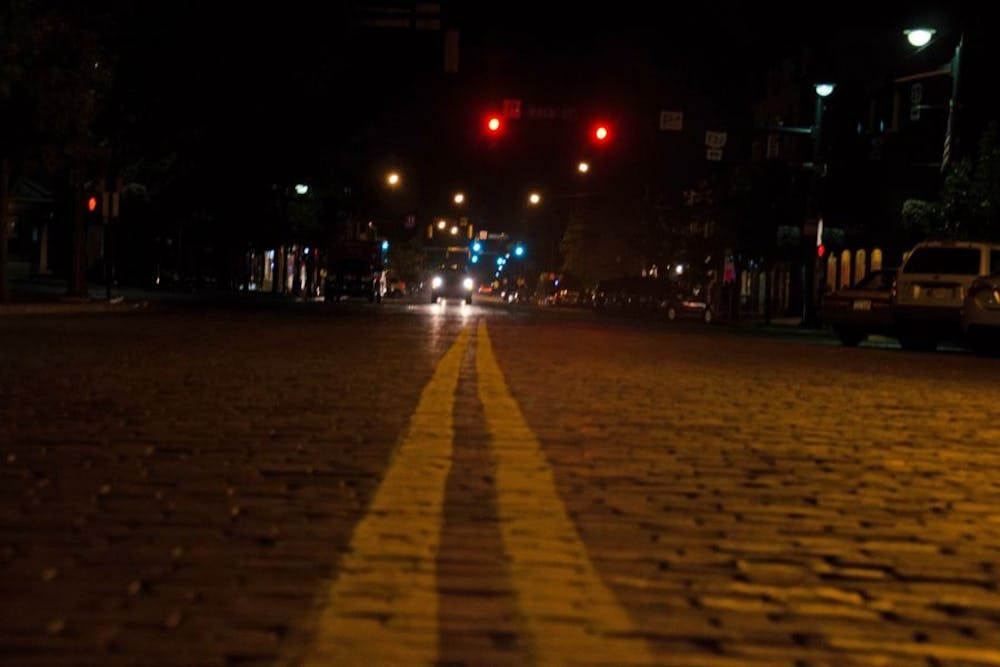Milam's Musings
I had a chance to see a different side of Miami's drinking culture on Sep. 4: from the perspective of responding police officers and EMTs.
A storm had just passed over the area on that night and the ground was still wet, but it didn't deter hundreds from pouring into Brick Street. Most of the calls to dispatch came rapid-fire around 2 a.m. when then the bars started to close.
Now, obviously, not all 15,813 students on Miami's campus drink, and even for those that do, many manage either by being smart and/or lucky, to not end up needing a police and ambulance response.
But unfortunately, I saw up close those who did and it was eye-opening. I'm not immune to partying myself and I've seen my fair share of drunk, passed out individuals, but from the perspective of the police and EMTs, those individuals I saw looked completely helpless and pathetic. And I couldn't help but wonder what brought them to that point.
Surely, hours before, these wasted individuals were having a good time, with friends and the like, and then at some point, they careened past their limits and the friends had disappeared. Some end up making mistakes that go beyond a terrible hangover, like getting in a fight and waking up with a bloody shirt.
Drunks stumbling home from Brick Street to wherever their dorm room is, alone in the dark, some barely managing to get into a taxi and others making the disappointing call to try to drive.
Meanwhile, MUPD and the three ambulances from the city of Oxford were doing their best to respond to the predictable influx in drinking-related incidents. So many calls were coming in for drunk students, all of the ambulances at one point were tied up in those calls and a seizure call was delayed for 10 to 15 minutes.
Granted, responding to someone that may have alcohol poisoning or be in some other perilous circumstance is necessary, but at the same time, one makes a choice to drink; one doesn't make a choice to have a seizure.
I just kept asking myself, "What is wrong with these people?" It's hard not to feel self-righteous and judgmental when you're sober literally looking down on a drunk person stumbling into an ambulance, but it seems the height of foolishness to me.
Nobody likes to be preached out or moralized to, but I like to think most of us came to Miami to further our education, establish a foothold for a future career and/or for the purpose of learning for its own sake. However, it's not surprising that if you take thousands of kids fresh out of high school and put them in an atmosphere away from home, that they're going to go through the trouble of a fake ID or getting it from someone older, to engage in the "drinking culture." Or the older ones that have been well-adapted to that culture after years of a being here, maybe see it as aa reprieve of sorts in-between days of studying and hard-work.
I get that. But whenever I drink, I try to follow three simple guidelines to ensure a fun, but smooth night. First and foremost, I know what my limits are, but things do happen, so secondly, I have friends that watch my back and I watch theirs. I wouldn't let a friend stumble home alone or take senseless shot after senseless shot when I know they're already far gone. And third, I tend to not put myself in environments where I know I could end up doing something illegal or necessitating a police response. The most obvious example here is pre-arranging a way to get back home if you're drinking, so you don't even get tempted to drive.
Enjoy what you're reading?
Signup for our newsletter
For sure, I'm not perfect, either, and I've made my fair share of mistakes in a night of drinking. But I had the aforementioned guidelines in place to act as a safety net, plus a little luck doesn't hurt.
There's nothing wrong with responsible drinking, but I saw the face of irresponsible drinking that night and it was ugly.
According to The Princeton Review's latest ranking of party schools, Miami is 19 on the list, which is actually down from two years ago when Miami ranked ninth.
Last September, President Hodge announced the Alcohol Task Force, charged with better understanding the impact of high-risk alcohol on the community, evaluating the efficacy of interventions and to developing a strategic plan for reducing the costs associated with high-risk alcohol consumption.
Tasks forces usually generate eye rolls because it looks more like the optics of appearing to do something rather than actually doing something. And for good reason, Miami's go-to the last few decades is to create a task force of some sort.
Nevertheless, the report does show that MUPD and the Office of Ethics and Student Conflict Resolution spend a lot of time and resources every year on alcohol-related issues. For instance, last year, there were 347 intoxication citations, 555 citations for prohibited use of alcohol and 20 citations for property damage/theft involving alcohol.
As is often the case, though, issues, especially issues concentrated in the student body, is up to the students themselves to fix. No amount of pestering from Miami or task force action is going to make students drink more responsibly.
This is just me, student-to-student, hoping to persuade some people to make better choices when hitting up Brick Street.
Moreover, I would encourage any student to go on a ride-along with MUPD on a typical Friday or Saturday night to get this other perspective on the dangers and the stupidity involved in irresponsible drinking.
I think if every student who drinks did this, then they would be more likely to make safer and smarter decisions.




